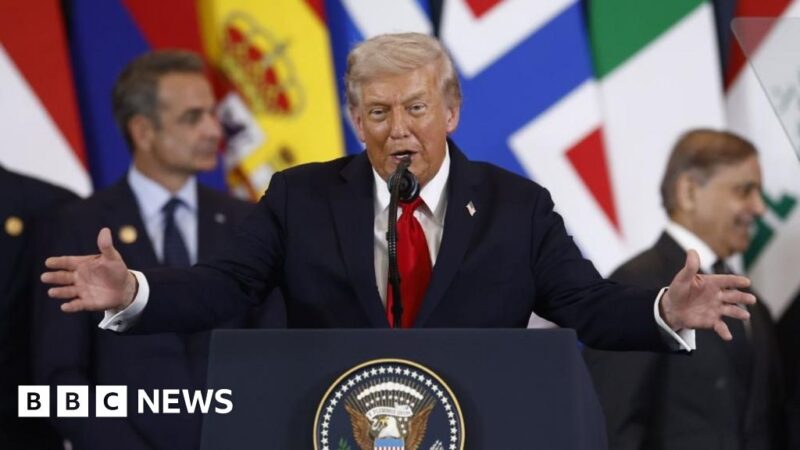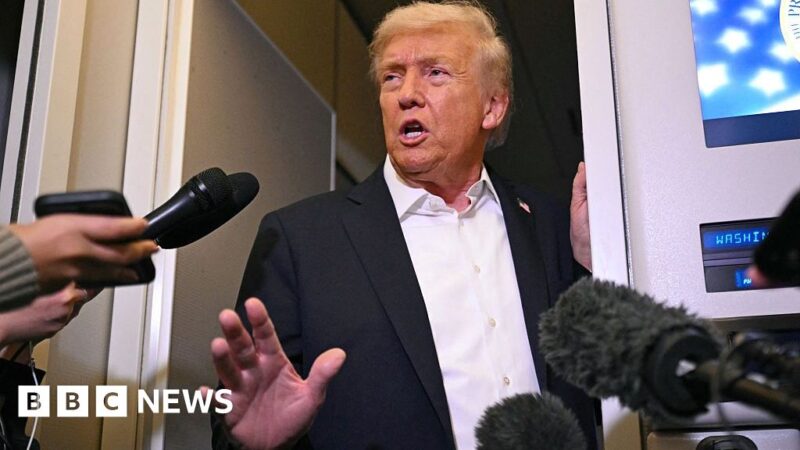Contributor: Trump’s ultimatum to USC and others is a dismally researched document
The Trump administration’s recently released Compact for Academic Excellence in Higher Education has landed in the inboxes of nine universities, including our own University of Southern California. Included in the proposed terms — which, if agreed to, are supposed to loosen the spigots of federal funding for academic collaborators — is a warning that units should not “purposefully punish, belittle, and even spark violence against conservative ideas.”
Threatening punishment and violence for contrary opinions is beyond the pale for any civic actor — a lesson that should be shared with Trump consigliere Stephen Miller, who recently labeled left-leaning advocacy groups and foundations part of a “vast domestic terror movement.” But the idea that one should not “belittle” seems a bit overheated coming from a set of political actors that have shared AI-generated memes of Democratic leaders of the Senate and the House adorned in sombreros and spouting fabricated quotes.
Plus, the compact itself invites more than a bit of skepticism. On Friday, MIT became the first of the nine universities to reject the terms, and it’s easy to understand why it would.
Consider the stern warnings against using race and gender in hiring and admissions. News alert: The use of race in both situations is already a settled matter for institutions taking federal dollars.
When it comes to admissions, the Supreme Court banned race-conscious decisions in a 2023 ruling. But in any case, USC’s approach to expanding access has been to invest in local recruitment pipelines through a highly respected Neighborhood Academic Initiative and to provide tuition waivers for low-income families, regardless of race.
As for the hiring side, USC’s diversity gains over the last 15 years have been incremental and reflect underlying trends. The share of tenure or tenure-track faculty at USC that is Black creeped to 5% from 3% between 2010 and 2025, while the Latino share edged to 6% from 5%, and the Asian American share rose to 19% from 17%. According to the National Science Foundation, that’s pretty much in line with the growth in recent PhDs by ethnicity — although we do seem to be lagging in hiring from the newly minted Latino professoriate. As empirical social scientists, we fail to see much evidence of a heavy affirmative action thumb on the scale.
The compact would also toss away once-cherished conservative ideas about the sanctity of markets. Even as the GOP tears into New York City mayoral candidate Zohran Mamdani for daring to suggest a rent freeze, the compact seeks to prohibit tuition hikes over the next five years. It couples that with a sharp limit on foreign students that is sure to diminish the reputation of USC, a place whose steady reputational climb in the last few decades has included attracting a high-caliber student body that is now 27% “non-resident.”
The compact also seeks to alter what sort of education will be delivered. It proposes another market intervention in which tuition would be waived for those pursuing the hard sciences. Adding up the five-year freeze, the loss of revenue from foreign students (who often pay full freight and so help to subsidize others) and the selective tuition breaks, the proposal seems less like reform and more like a blueprint to bankrupt a university already experiencing financial distress.
So how would we grade the compact that the administration has submitted?
First: As professors, we warn our students that we run their papers through a plagiarism-checker — and this compact would have failed that test. As reported in the New York Times, many of the ideas and even some of the exact language — including what’s in the only two seemingly academic footnotes — were lifted directly from a memo drafted months earlier by a conservative group linked to billionaire Marc Rowan.
Second: When we grade, we always try to offer some positive notes — after all, one doesn’t want to belittle. One has to really scour the compact for praiseworthy nuggets, but here’s one: We wholeheartedly agree that encouraging military veterans to enroll should be an even higher priority than it already is at USC. We have experienced such students (as well as those in the campus ROTC) as dedicated, earnest and hard-working — and far more open to the benefits of diversity than the authors of this compact seem to be. After all, the military is far more diverse than the overall U.S. population (for now).
After praising the compact’s creators for that one worthy thought, we’re sort of at a loss. They correctly point out that grade inflation is a problem but propose no real solution. Most of the grammar seems correct, so that’s something? But this is a dismally researched — and often frightening — document that ultimately seeks to legislate ideology under the guise of academic excellence.
USC already stands for academic excellence, and we do it without ideological loyalty oaths. We hope our leaders will see this deal for the folly that it is and will have the courage to call it out as MIT did. That’s the way to stand up for academic freedom, fiscal responsibility and just plain common sense.
Manuel Pastor and Jody Agius Vallejo are professors of sociology at USC.
Insights
L.A. Times Insights delivers AI-generated analysis on Voices content to offer all points of view. Insights does not appear on any news articles.
Viewpoint
Perspectives
The following AI-generated content is powered by Perplexity. The Los Angeles Times editorial staff does not create or edit the content.
Ideas expressed in the piece
The authors argue that the Trump administration’s Compact for Academic Excellence represents a hypocritical and poorly conceived attempt to control higher education. They contend that the compact’s admonition against “belittling” conservative ideas rings hollow coming from an administration whose officials, including Stephen Miller, have labeled left-leaning groups a “vast domestic terror movement” and shared AI-generated memes mocking Democratic leaders. The authors emphasize that the compact’s restrictions on using race and gender in hiring and admissions are redundant, as the Supreme Court already banned race-conscious admissions in 2023, and USC’s diversity gains have been incremental, reflecting national trends in PhD production rather than aggressive affirmative action policies. They assert that between 2010 and 2025, USC’s tenure-track faculty diversity increased modestly—Black faculty from 3% to 5%, Latino from 5% to 6%, and Asian American from 17% to 19%—numbers that align with National Science Foundation data on recent PhDs by ethnicity[1][2].
The authors characterize the compact as an abandonment of traditional conservative market principles, noting the irony that Republicans criticize rent freezes while mandating a five-year tuition freeze for universities. They warn that the compact’s provisions—including caps on foreign students at 15% of undergraduates and limits of 5% from any single nation—would financially devastate universities like USC, which has achieved significant reputational gains through attracting a high-caliber international student body representing 27% of enrollment[2]. Combined with waiving tuition for hard science students and losing revenue from international students who often pay full tuition, the authors conclude these requirements would bankrupt already financially stressed institutions rather than reform them.
Pastor and Agius Vallejo accuse the compact of plagiarism, noting that according to the New York Times, many ideas and exact language were lifted from a memo drafted by a conservative group linked to billionaire Marc Rowan. While they concede one praiseworthy element—encouraging military veteran enrollment—they otherwise find the document dismally researched and ideologically driven, designed to legislate conformity under the guise of academic excellence. They urge USC leadership to follow MIT’s example in rejecting the compact, arguing that such rejection would defend academic freedom, fiscal responsibility, and common sense while maintaining USC’s existing commitment to excellence without ideological loyalty oaths.
Different views on the topic
The University of Texas at Austin expressed almost immediate interest in the compact, suggesting some institutions view its terms as potentially beneficial rather than threatening[2]. A senior White House adviser explained that the compact aims to help schools pursue policies that “are not hard decisions, but they are hard to go at it alone,” framing the agreement as collaborative support rather than coercive control[1]. The administration emphasized that schools agreeing to the compact would receive substantial benefits including increased overhead payments where feasible, meaningful federal grants, invitations to White House events, and opportunities for discussions with administration officials[1][3].
Administration officials clarified that the compact does not seek to limit funding exclusively to signatory institutions, with senior adviser May Mailman stating that the Trump administration doesn’t plan to restrict funding only to universities that agree to the terms, suggesting participation remains voluntary rather than punitive[3]. The compact itself frames participation as preserving institutional choice, noting that universities “are free to develop models and values other than those below, if the institution elects to forego federal benefits,” positioning the agreement as an optional pathway to enhanced federal partnership rather than mandatory compliance[2][3].
The compact’s provisions address several policy priorities the administration considers underserved in higher education, including protections for conservative viewpoints on campus, efforts to transform or abolish units that “purposefully punish, belittle and even spark violence against conservative ideas,” and establishing single-sex spaces and fair competition in sports[3]. The agreement also seeks to address concerns about foreign influence on American campuses through student caps, grade inflation through reporting requirements, and affordability through tuition freezes and selective waivers for students pursuing hard science programs[2]. The administration positioned these requirements as mechanisms to uphold academic excellence while ensuring institutions align with federal priorities in exchange for preferential treatment and enhanced funding opportunities[1][3].





